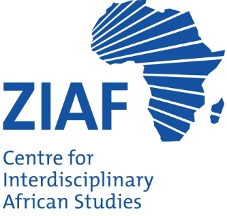Centre for interdisciplinary African Studies - Frankfurt

Zentrum für interdisziplinäre Afrikaforschung (ZIAF)
Johann Wolfgang Goethe-Universität, Frankfurt, Germany
Network of the Rhine-Main-Universities:
https://afrikaforschung-rheinmain.de/
Dr. Stefan Schmid
ZIAF
Goethe-Universität Frankfurt
Norbert-Wollheim-Platz 1
60323 Frankfurt am Main
+ 49 69 79832097
News and events:
Research and publications:
ZIAF represents around 100 academics from nine departments are involved in the ZIAF, with a broad disciplinary spectrum. At present, the members of the ZIAF are organised in four main research areas:
I. Transregional Studies
This research deals with the interactions between Africa, Europe and Asia, with the aim of systematically exploring, conceptualising and theoretically locating transregional "in-between spaces".
II Cultural History and Ecological Change
The focus is on settlement history, economy and the formation of political structures, as well as prehistoric art in its social, cultural and ecological context.
III. Language, discourse, communication
This area is devoted to linguistic analysis and the sociology of language on questions of language and cultural change.
IV. Sustainable resource management
Bio- and geoscientific research on sustainability deals with plant resources, the degradation of landscape ecosystems, and the environmental impacts of mining and infrastructure projects.
Teaching in African Studies:
Bachelor's degree programme "African Languages, Media and Communication”
Together with JGU Mainz, we offer a newly developed African Studies BA programme in Frankfurt. Mobility and migration between Africa and Europe, practices of digital communication and increased media coverage demand an African expertise in many professional fields in Europe today that meets these new requirements in terms of content, language and methodology.
The degree programme "African Languages, Media and Communication" (ASMeK) offers a sociolinguistic, media-linguistic and structural-linguistic basic education with reference to African languages. A central component of this degree programme is also practical language training in two languages. At least one of these is an African language which is learned over a period of two years in order to achieve basic communication competence. In addition, the programme provides important overview knowledge in various relevant areas of linguistic-cultural production in Africa and in the African diaspora.
Libraries and collections:
Fachinformationsdienst Afrika (FID)
The FID continues the systematic acquisition of hard-to-access publications from African countries for a broad spectrum of subjects in the humanities, cultural studies and social sciences. The academic discourses and research results conducted in Africa are to be made accessible in Germany. This enables equal research with scholars in Africa on an equal footing and puts empirical information, especially in the area of statistical data, on a better footing. It also improves the chances of reception for African science.
This is a database for vegetation data from West Africa, i.e. phytosociological and dendrometric relevés as well as floristic inventories.
Network and partners:
Staff:
